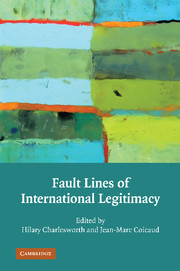Book contents
- Frontmatter
- Contents
- Acknowledgments
- Contributors
- Introduction
- PART I FROM THE HISTORY AND STRUCTURE OF INTERNATIONAL LEGITIMACY TO FAULT LINES IN CONTEMPORARY INTERNATIONAL POLITICS
- 1 Legitimacy, Across Borders and Over Time
- 2 Deconstructing International Legitimacy
- 3 The Evolution of International Order and Fault Lines of International Legitimacy
- 4 Intervention in a “Divided World”: Axes of Legitimacy
- 5 From Berlin to Bonn to Baghdad: A Space for Infinite Justice
- PART II THE UN SECURITY COUNCIL: EXPRESSION, VENUE, AND PROMOTER OF INTERNATIONAL LEGITIMACY?
- PART III LEGITIMACY OF INTERNATIONAL INTERVENTIONS AND HIERARCHY OF INTERNATIONAL RIGHTS
- PART IV IN SEARCH OF NEW FORMS OF INTERNATIONAL LEGITIMACY: BETWEEN POWER AND PRINCIPLES
- Conclusion: The Legitimacies of International Law
- Index
- References
4 - Intervention in a “Divided World”: Axes of Legitimacy
Published online by Cambridge University Press: 06 April 2010
- Frontmatter
- Contents
- Acknowledgments
- Contributors
- Introduction
- PART I FROM THE HISTORY AND STRUCTURE OF INTERNATIONAL LEGITIMACY TO FAULT LINES IN CONTEMPORARY INTERNATIONAL POLITICS
- 1 Legitimacy, Across Borders and Over Time
- 2 Deconstructing International Legitimacy
- 3 The Evolution of International Order and Fault Lines of International Legitimacy
- 4 Intervention in a “Divided World”: Axes of Legitimacy
- 5 From Berlin to Bonn to Baghdad: A Space for Infinite Justice
- PART II THE UN SECURITY COUNCIL: EXPRESSION, VENUE, AND PROMOTER OF INTERNATIONAL LEGITIMACY?
- PART III LEGITIMACY OF INTERNATIONAL INTERVENTIONS AND HIERARCHY OF INTERNATIONAL RIGHTS
- PART IV IN SEARCH OF NEW FORMS OF INTERNATIONAL LEGITIMACY: BETWEEN POWER AND PRINCIPLES
- Conclusion: The Legitimacies of International Law
- Index
- References
Summary
Following World War I, which ended more than eighty-three years ago, the whole Islamic world fell under the crusader banner – under the British, French, and Italian governments. They divided the whole world.…Those who refer things to the international legitimacy have disavowed the legitimacy of the Holy Book…
– Osama bin Laden, November 2001[The UN must] prove to the world whether it's going to be relevant or whether it's going to be a League of Nations, irrelevant.
– George W. Bush, September 2002And while it is difficult to see the world body go down the drain like its predecessor the League of Nations…it is equally difficult to see how the United Nations will regain the status and relative coherence it enjoyed before Operation Iraqi Freedom.
– The Independent (Banjul), March 2003Status and Coherence
The Internationalist Dream. It would be tempting to look back at the long post–Cold War decade as an era of the more or less steadily growing legitimacy of an activist internationalism – an era that began with 1989 and ended somewhere between “9/11” and the U.S. invasion of Iraq. A representative example of this perspective was provided by a writer in a Gambian newspaper shortly after the beginning of the Iraq invasion (the third of the three epigraphs to this chapter). The writer declared that the U.S. attack would probably signal the demise of the “status and relative coherence” previously enjoyed by the United Nations, condemning it to the fate of its predecessor, the League of Nations.
- Type
- Chapter
- Information
- Fault Lines of International Legitimacy , pp. 115 - 145Publisher: Cambridge University PressPrint publication year: 2010



